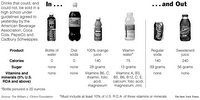A Feel-Good Ban On Soda?
 It seems to me that there are at least a few things to think about when it comes to the much-heralded soda ban, chief among them questions about whether the ban is anything more than a feel-good exercise that will ever be fully implemented.
It seems to me that there are at least a few things to think about when it comes to the much-heralded soda ban, chief among them questions about whether the ban is anything more than a feel-good exercise that will ever be fully implemented.Bans -- whether it's banning liquor or banning assault weapons -- hardly ever work as well as intended (or at all), a fact noted too infrequently in the breathless press coverage last week. Remember that this ban is being phased in over three years, is conditioned on districts redoing their beverage contracts, and excludes high-sugar juices. Past experience also suggests that kids will get around this.
For a bit of context and a healthy dose of skepticism, check out this article (Goodbye, war on smoking. Hello, war on fat.) from Slate.

2 Comments:
If the bans permit "diet" sodas (saturated with artificial ingredients), fake "punch" (made with fake colors and refined sugar), "chocolate milk" (more refined sugar), and candy made from refined sugar and fake substances, I forsee little or no positive health impact.
From the 2nd District of the California State PTA (San Francisco), here's a roll call of myths vs. facts on childhood obesity and school junk food sales:
Claim: “All foods can be part of a balanced diet!”
Response: Sure, as an occasional snack. But a daily lunch of junk food harms kids’ health and their ability to learn.
Claim: “Kids should have free choice and should learn to exercise personal responsibility!”
Response: We don’t expect young children to exercise personal responsibility by crossing the street alone. We hold their hands. And until they’re grown up, we still guide and protect our kids.
Claim: “Kids won’t eat healthy food!”
Response: “Healthy” doesn’t have to mean exotic organic-vegan creations. Familiar foods like sandwiches, soup, pasta, salad, chow mein and baked chicken are both healthy and kid-friendly.
Claim: “Kids will just go off campus to buy junk food!”
Response: Maybe. But schools must not contribute to harming their health. When schools teach about the importance of good nutrition, they undermine their own message by encouraging a diet of junk food. Schools need to be part of the solution, not part of the problem.
Claim: “Offering poor choices teaches kids to choose wisely!”
Response: If that were true, obesity would decrease as junk food proliferated in schools. And we don’t offer kids cigarettes, alcohol or pornography to teach them to make wise choices.
Claim: “What obesity epidemic? All we need are willpower, self-discipline and responsible parenting!”
Response: The new book “Generation Extra-Large”* provides a compelling response to this argument. Childhood obesity is skyrocketing worldwide. To quote from the book: “If obesity is a personal failing…the planet must be experiencing a huge, widespread and simultaneous breakdown of self-control and good sense. … As childhood obesity spreads across the globe, the logic behind the personal weakness argument falls apart. There’s no way so many kids in so many diverse cultures could suddenly lose their willpower.”
Claim: “18-year-olds can serve in the military and vote, and some high-schoolers are 18, so they should have access to whatever foods they want!”
Response: 18-year-olds CAN eat whatever foods they want – they just shouldn’t be able to buy them at school. Schools need to emphasize protecting the youngest and most vulnerable students rather than accommodating the oldest and least vulnerable.
Claim: “But schools need the money from selling junk foods!”
Response: To paraphrase a recent editorial in a Tennessee newspaper: If selling junk food at school leads to even one new case of Type 2 diabetes in a student, is that price worth paying for what the money provides – whether it’s new football uniforms or the junior class trip?
*”Generation Extra-Large: Rescuing Our Children from the Epidemic of Obesity,” by Lisa Tartamella, Elaine Herscher and Chris Woolston. 2004, Basic Books, New York. Quotes from pages 135-136.
For more information on healthy school food, go to www.pasasf.org
For the San Francisco Unified School District’s healthy food policy and related information, go to www.sfusdfood.org
Caroline Grannan
2nd District of the California State PTA
Post a Comment
<< Home